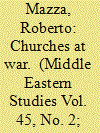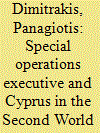|
|
|
Sort Order |
|
|
|
Items / Page
|
|
|
|
|
|
|
| Srl | Item |
| 1 |
ID:
090118


|
|
|
|
|
| Publication |
2009.
|
| Summary/Abstract |
The purpose of this article is to discuss the role and status of the Christian churches in Jerusalem from the beginning of the twentieth century until 1920 when British Military Administration of Palestine came to an end, with a particular focus on the First World War period. The first part of the article provides some historical background on a number of crucial issues: the history of the Christian churches in Jerusalem, the relationship between the churches and the Ottoman authorities, competition with the European powers for the control of the Holy Places, the Status Quo and the capitulations which were the most important political features of Christian Jerusalem until 1914. The case study of the Custody of the Holy Land explains the impact of the war on Christian institutions during and after the conflict, particularly in 1918 when the Custody rebuilt its influence in the city and on the international stage. The second part of the article focuses on the war period and the creation of the Christian-Muslim associations which, to an extent united the Arab population of the city providing a different example of the impact of the war on the Christian institutions of Palestine and Jerusalem.
|
|
|
|
|
|
|
|
|
|
|
|
|
|
|
|
| 2 |
ID:
090121


|
|
|
|
|
| Publication |
2009.
|
| Summary/Abstract |
The PLO, the article attempts to prove, is dead, contributing to the withering of Palestinian diaspora political life. If true, the life and death of the PLO is rife with the paradox of substantiating the most basic of Zionist claims that reterritorialization and the withering of diaspora can only be perceived as a trade-off with a deterministic end in favour of political territoriality. Palestinians face the tragedy of being divided in the territory of contestation and are farther than ever from achieving statehood, while in the near abroad and beyond they are hardly in a position to form a trans-state community.
|
|
|
|
|
|
|
|
|
|
|
|
|
|
|
|
| 3 |
ID:
090116


|
|
|
|
|
| Publication |
2009.
|
| Summary/Abstract |
Over the last two decades, the political ideology of the Egyptian Muslim Brotherhood has evolved to proactively advocate a democratic form of government. This evolution has taken place both through protracted internal discussion and through experiments in participatory politics, leading the Brotherhood to further develop Islamic justification for a democratic regime. Despite generational differences within the Brotherhood over the extent of democratic activism, the Brotherhood's emerging political platform asserts the need both for a democratic regime and a 'civil state' which guarantees political and civil liberties within the boundaries specified by Islam. Three guiding principles are central to the Brotherhood's current political vision, including legislative compliance with Islamic law, a wide range of civil and political liberties with an emphasis on equal treatment, and a robust electoral process that institutionalizes guarantees of democratic accountability for elected officials. These principles allow the Muslim Brotherhood to effectively challenge the current Egyptian regime on democratic grounds, but are also in tension with one another, highlighting the boundaries of legislative independence under a political system constrained by Islamic law.
|
|
|
|
|
|
|
|
|
|
|
|
|
|
|
|
| 4 |
ID:
090120


|
|
|
|
|
| Publication |
2009.
|
| Summary/Abstract |
Ottoman claims to universality - embodied in Ottoman imperialism, Ottoman Islam, and Ottoman cosmopolitanism - were undermined and ultimately shattered by the encounter with ascendant Europe. Following near-dismemberment after the First World War, Mustafa Kemal categorically rejected Ottoman universalism in favour of a non-irredentist, secularist nationalism. His brand of Turkish particularism shaped national identity and foreign policy for much of the twentieth century. Since the 1980s, however, a growing number of Turks have begun to revisit the Ottoman past. They are drawn to one or another of the three dimensions of Ottoman universalism which they use to make alternative national and foreign policy claims. This study provides a brief, schematic account of the later years of the Ottoman Empire and early years of the Turkish Republic in order to trace the metamorphosis of Ottoman universalism into Turkish particularism. It then explores how Kemalists, Islamists, liberals, and ultranationalists appropriate Ottoman universalism today in their attempts to redefine national identity and foreign policy.
|
|
|
|
|
|
|
|
|
|
|
|
|
|
|
|
| 5 |
ID:
090114


|
|
|
|
|
| Publication |
2009.
|
| Summary/Abstract |
The article investigates the so-called 'Huthi crisis' in northern Yemen, centering on the recent confrontation between Zaydi Shi'is and the government. The crisis is analysed in the context of local contestations over moral authority and regional developments since the late 1970s. The article shows how regional and global dynamics, notably Cold War strategic alliances, Saudi Arabia's aspirations to contain Shi'ism on the Arabian Peninsula and American security concerns since 2001, have impacted local politics and configurations of power. The article argues that anxieties over the past remain, against the backdrop of the politicisation and repression of the Zaydi revivalist movement, depicted by the government as aiming to restore the imamate. The government was open to accusations of ambivalence towards Sunni militants, by using them alongside the army and giving them positions of power while at the same time claiming to counter their influence. Action against the Zaydis established its credentials in the 'war on terror.
|
|
|
|
|
|
|
|
|
|
|
|
|
|
|
|
| 6 |
ID:
090122


|
|
|
|
|
| Publication |
2009.
|
| Summary/Abstract |
Events in Lebanon are primarily interpreted through the lens of sectarianism and religious difference. Yet if we look at Lebanon through the lens of politics of space, significant similarities emerge among populations that are otherwise considered different. For instance, communities in Lebanon's geographical borderlands are home to disproportionate numbers of martyrs. As a result of a policy of neglect by elites at Lebanon's political centre, communities of Sunnis and Shiites in North and South Lebanon similarly identify as disenfranchised and oppressed (al-mahrum?n or al-mazlum?n). My research is supported by interviews with families of martyrs of recent violence, analysis of newspaper articles, as well as a reading of roadside martyr images in North and South Lebanon.
|
|
|
|
|
|
|
|
|
|
|
|
|
|
|
|
| 7 |
ID:
090123


|
|
|
|
|
| Publication |
2009.
|
| Summary/Abstract |
Soaring oil prices since the early 2000s has led to a historic transformation of wealth from consuming regions to major oil exporters. In recent years many of these exporters have set up oil funds to utilize their massive and growing oil revenues. These funds are divided into two categories - stabilization and saving funds. Their large investments in Western markets have raised concern that they might be driven by political and strategic interests rather than commercial concerns. This study examines oil funds in the Persian Gulf. It discusses US and European proposals to regulate oil fund investments and argue against excessive regulation.
|
|
|
|
|
|
|
|
|
|
|
|
|
|
|
|
| 8 |
ID:
090124


|
|
|
|
|
| Publication |
2009.
|
| Summary/Abstract |
With the breakup of the Soviet Union at the end of the Cold War, three republics in the South Caucasus (Georgia, Armenia, and Azerbaijan) achieved independence for the second time during the twentieth century. Their first experience was contentious and short-lived, had little or no support from the Western powers and was brought to end by the newly formed Soviet Union with the tacit approval of Turkey. While Georgian, Armenian and Azerbaijani national aspirations were quashed in the early post-First World War era, Zionism was given encouragement with the establishment of the Palestine Mandate. When Israel was established it was given immediate recognition by the Soviet Union, but most Jews from Georgia and Azerbaijan - Armenia's population was very small in comparison - only made their way to Israel during the last years of the Cold War. On the other hand, following the Second World War, some members of the Armenian Diaspora, including those in the Arab world, immigrated to the Soviet Union. While Soviet-Israeli relations had been strained since the Six-Day War, the end of the Cold War not only brought better ties between Russia and Israel, but it allowed Israel to establish relations with the other successor states of the former Soviet Union. Many of those countries sought ties with Israel (and the other Western states) to insure their continued independence from Russia, while, at the same time, Arab-Israeli relations improved and Turkey and Israel drew closer together. Iran was regarded with suspicion by Azerbaijan and along with Georgia, which wanted to enhance its ties with the West, drew closer to Turkey. Both countries have benefited from the transport of oil. Jews from Georgia and Azerbaijan have kept close connections with their former countries, where anti-Semitism was never the problem it was in Russia. Armenia has remained the closest to Russia with its conflict with Azerbaijan over Nagorno Karabakh and its distrust of Georgia. However, Armenians experienced genocide at the hands of the Ottomans and have sought support from Israel over that issue.
|
|
|
|
|
|
|
|
|
|
|
|
|
|
|
|
| 9 |
ID:
090125


|
|
|
|
|
| Publication |
2009.
|
| Summary/Abstract |
Cyprus, together with Gibraltar and Malta, constituted the 'crown jewels' of British sea power in the Mediterranean during the Second World War. Being deployed on Cyprus the Royal Navy and the Royal Air Force could fight the Germans and Italians in the Southeast Mediterranean, thus inhibiting the continuous supply with troops and war material of the Africa Corps of Field Marshall Ervin Rommel. This article aims to shed light on the activities of the Special Operations Executive on the island. Citing recently declassified files we assess the espionage and propaganda as well as the guerrilla warfare contingencies in case of an Axis invasion of Cyprus. We provide a critical assessment of the British guerrilla warfare strategy, arguing that the SOE and the 25th Army Corps based on Cyprus had not been well prepared to counter aggression due to inter-service rivalries, bad planning and lack of manpower. Besides, the SOE distrusted the Greek-Cypriots and the Turkish-Cypriots to the extent that the training of guerrillas was planned to commence only after a successful invasion and the occupation of the island. Finally, SOE officers considered the Cypriot communists with their anti-colonialist declarations as another threat to be confronted with special operations.
|
|
|
|
|
|
|
|
|
|
|
|
|
|
|
|
|
|
|
|
|